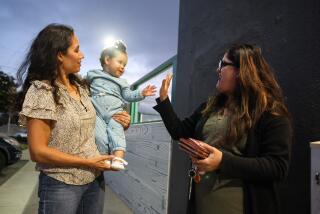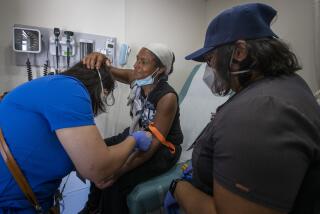LAGUNA BEACH : Clinic Hosts 30 Russian Physicians
- Share via
A group of 30 Russian doctors visited the Laguna Beach Community Clinic on Wednesday to learn one way the United States delivers health care to people who can’t afford it.
After touring the clinic, the men and women assembled in a run-down office where director Gary Erb described the clinic’s role in the community.
Gathered under a banner that read, “Goal--The Nordstrom’s of Community Clinics,” the physicians listened intently to their translator while others in the group took notes.
The single communication breakdown was quickly corrected: “Do you give patients IOUs here?” the translator asked Thomas A. O’Sullivan, a gynecologist who works three days a week at the clinic. “IUDs,” O’Sullivan said, unscrambling the abbreviation for the birth control device.
While the surroundings were humble--ripped upholstery in the waiting room where a young woman cradled a baby, and carpet taped together--clinic workers spoke proudly of the full range of services they offer to the 1,000 or more patients they see each month.
“Unfortunately, we’re part of a growth industry,” Erb said.
The visiting doctors asked a variety of questions. Who volunteers at the center? Does the clinic provide abortions? How are the doctors paid?
In the exchange that most amused the group, a visiting physician asked how clinic workers know the patients truly cannot afford to pay. “We ask them how much they make and we just believe them,” O’Sullivan said. “If he says he’s Santa Claus, we believe him.”
The touring doctors are visiting a number of health care facilities in Orange County during the seven days they will spend in California.
John M. Whiteley, a UC Irvine professor of social ecology who is leading the group, said the Russians hope to take back to their homeland information about the different ways health care is provided in the United States.
“What’s generally happened in that society is that the whole Soviet and community structures have collapsed,” Whiteley said.
Outside the clinic after her visit, Dr. Leila Karaeva said she thought it was “not good” that the clinic is in disrepair. However, she said she was impressed by its purpose.
“It’s very humanistic that in this affluent community they thought it was necessary to set up this clinic that takes care of the poor,” Karaeva said.
More to Read
Sign up for Essential California
The most important California stories and recommendations in your inbox every morning.
You may occasionally receive promotional content from the Los Angeles Times.













